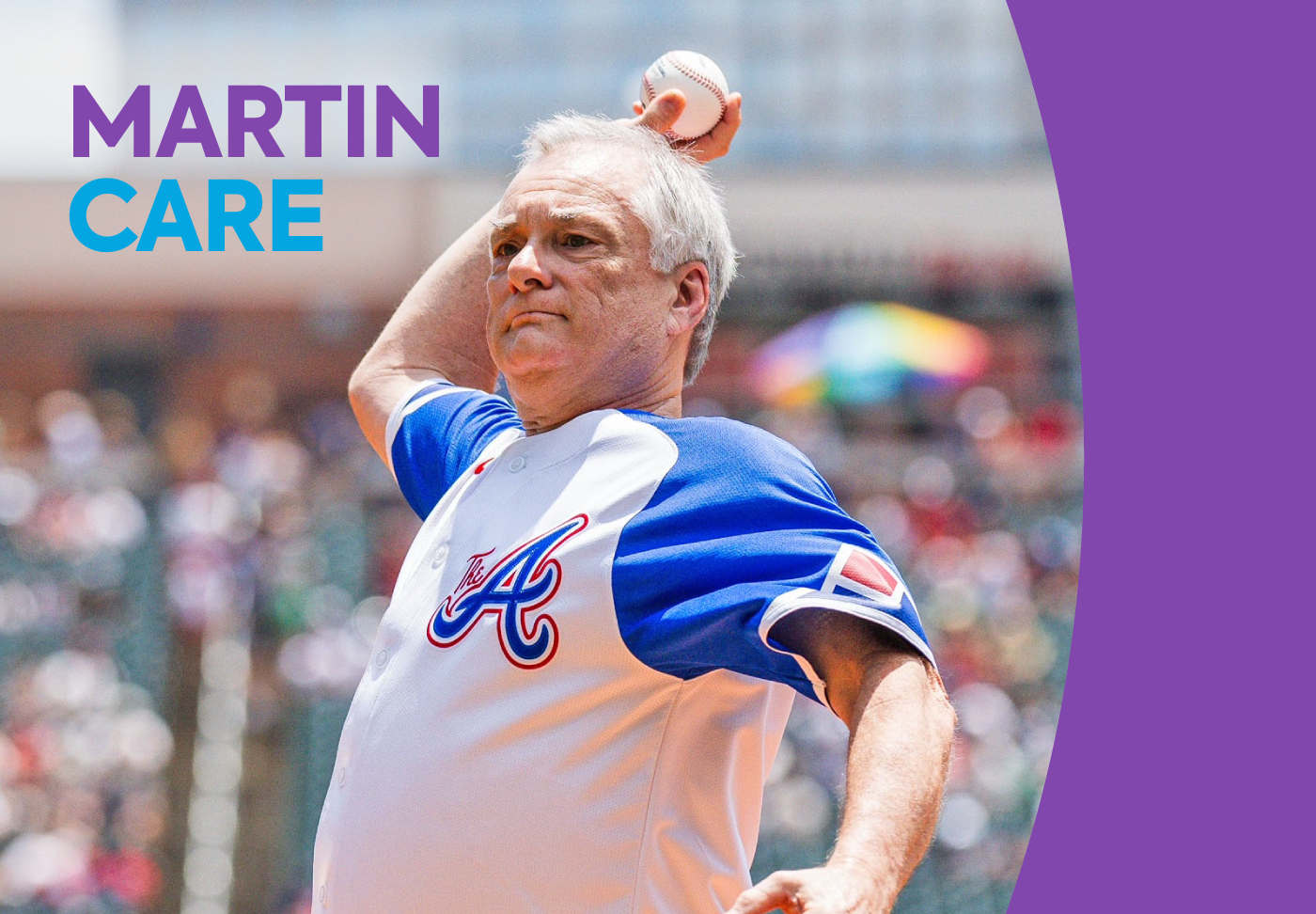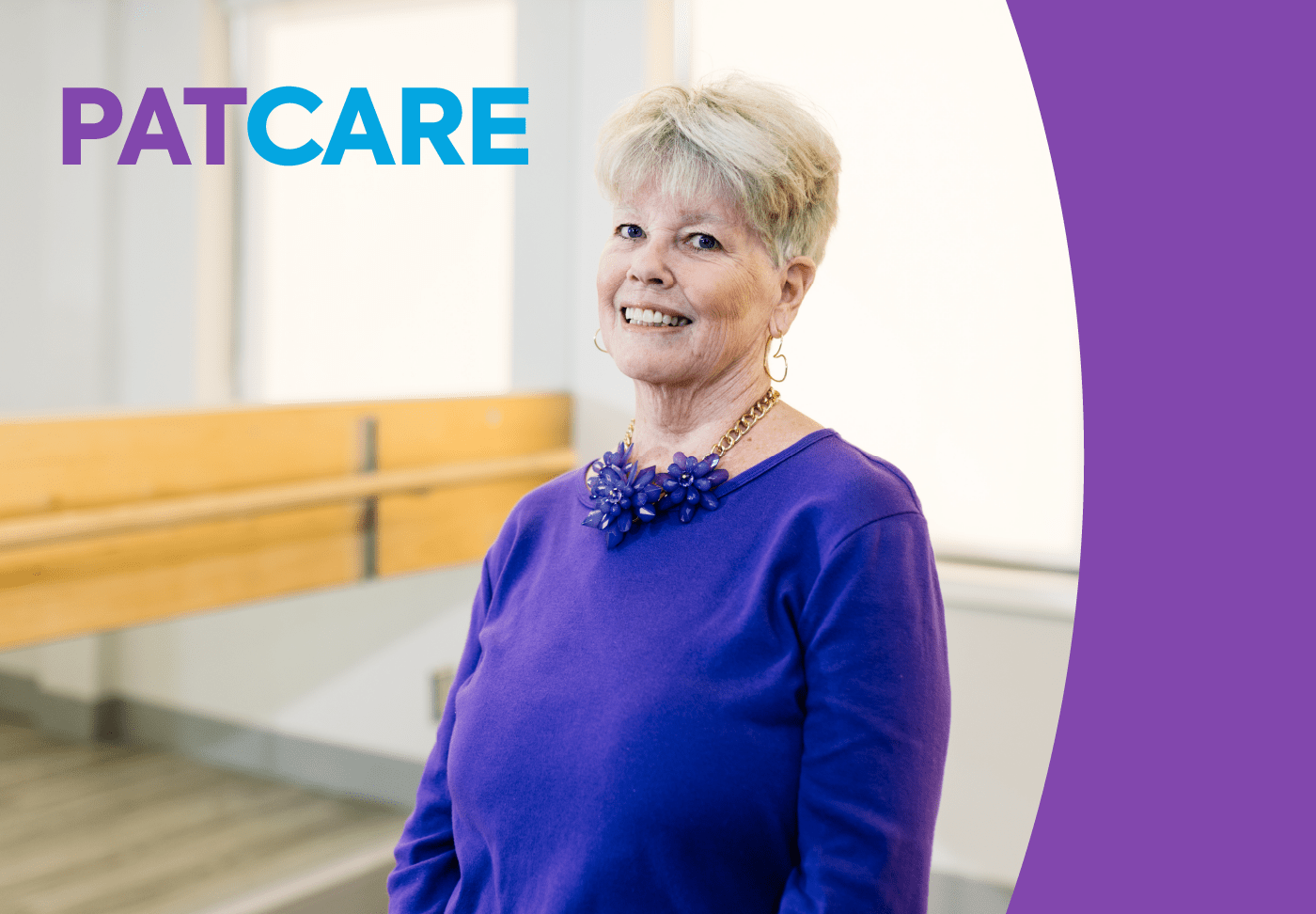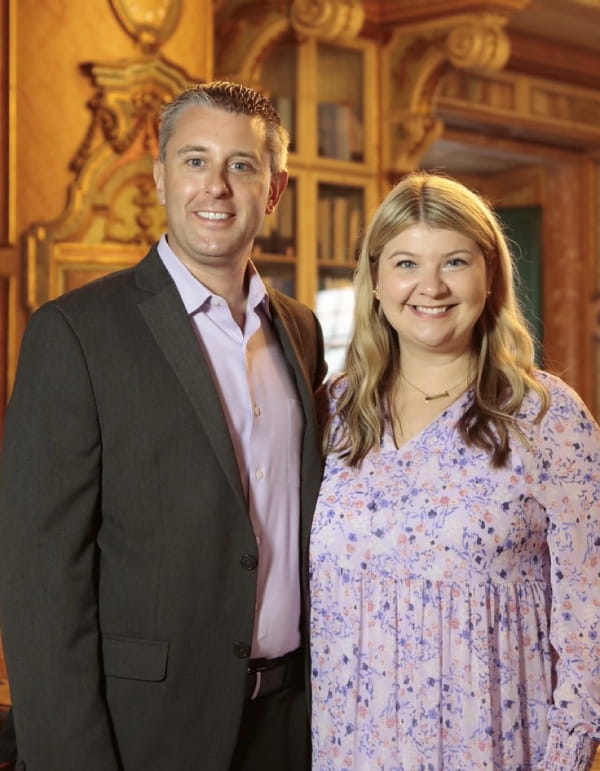There’s a reason the “widowmaker” heart attack got its nickname. According to the American Heart Association, the survival rate following this type of heart attack, which is caused by a blockage in the heart’s main artery, is only 12% when it occurs outside a hospital or advanced cardiac care center. But thanks to the swift response of his cardiac-nurse wife and the excellent care of his cardiovascular surgery team, Martin Hornberger is here to tell his story and offer hope to others.
The power of CPR
It was a Saturday morning in May. Martin started his day with breakfast and a cup of coffee—as he always did. He had no pain or unusual symptoms—merely some indigestion, which he managed by taking a few antacids, and fatigue that was a common symptom of his diabetes.
Aside from having diabetes, the Cartersville resident had always considered himself relatively healthy. When he wasn’t hard at work as an engineer, he spent much of his time outdoors and enjoyed staying active.
Everything changed later that day when he and his wife, Donna, left the house to see their granddaughter play tee ball. Halfway there, Martin collapsed while driving.
“I tried to tell my wife to take the steering wheel but never got the words out,” he said.
Donna, a cardiac nurse at Wellstar Kennestone Regional Medical Center, jumped into action. Unable to move Martin’s foot off the gas pedal, she eventually got the truck under control by turning off the ignition. Then, using her nearly 50 years of emergency room and cardiac training, she began administering hands-only CPR. Another driver who stopped to help called 911.
While the EMTs were en route, Donna was able to revive Martin by delivering multiple rounds of chest compressions to mimic the heart’s pumping action.
“Knowing her, she didn’t even have to think about it. Her training kicked in and she just went to work,” Martin said of his wife. “She’s the hero of this whole thing.”
Determining a plan for treatment
The EMTs rushed Martin to a nearby hospital in Rome, where the cardiac team performed an emergency stent to restore blood flow in his main heart artery and get him stabilized. However, further tests revealed even more blockage that could not be treated with additional stents. Martin would need heart bypass surgery.
Donna immediately began advocating for him to be transferred to her unit at Wellstar Kennestone for surgery. She wanted the best possible care for her husband and knew the Marietta hospital was a Certified Comprehensive Cardiac Care Center—the first in Georgia and the fourth in the nation to receive this highest certification in cardiovascular care by The Joint Commission and American Heart Association.
“I knew the process; I knew the people,” she explained. “If anyone could save my husband, it was them.”
Patient-centered approach
On Wednesday evening Martin was moved to Wellstar Kennestone, where he was introduced to Dr. Richard Myung, the cardiothoracic surgeon who would be performing his coronary artery bypass grafting (CABG) surgery. Dr. Myung took the time to explain to Martin everything that would happen during the procedure. The surgeon’s personable demeanor and genuine empathy immediately put Martin at ease.
“He has a tremendous bedside manner—his presence in the room was comforting,” Martin said. “The smile on his face and the relaxed confidence [gave me] reassurance that things are going to work out.”
Dr. Myung works as part of a larger multidisciplinary team to provide the highest quality care to every patient, from diagnosis to surgery and through recovery. His commitment to excellence has helped Wellstar Kennestone’s cardiovascular program earn a distinguished three-star rating from the Society of Thoracic Surgeons for its patient care and outcomes in isolated CABG. The award places the hospital among the most elite programs for heart bypass surgery in the U.S. and Canada.
Advanced techniques for improved outcomes
Martin’s case, unfortunately, was not unique for Dr. Myung. “Probably a third of our cases are bypass cases,” the surgeon explained.
CABG is regularly performed to treat people with multiple blocked coronary arteries. It involves a surgeon taking a healthy vein or artery from another part of the body (in Martin’s case, Dr. Myung used a vein from his leg and an artery from his chest wall) and attaching it to the aorta and the coronary artery above or below a blockage. This creates a new route for blood to flow around the blockage.
Although the most common approach is traditional open-heart CABG, where the heart is stopped and a heart-lung bypass machine is used, other less-invasive methods—including “off-pump” procedures, in which the heart does not have to be stopped—are sometimes an option. Dr. Myung determined that Martin could undergo an off-pump CABG, which reduces the risk of complications and often leads to a shorter hospital stay.
When the big day arrived, Martin’s procedure went smoothly, Dr. Myung reported. Thanks to his expert team and their advanced techniques, Martin was going to be okay.
Compassionate care at every step
Martin is grateful to the nursing team at Wellstar Kennestone for supporting him before, during and after his procedure.
“From beginning to end, they were attentive, encouraging [and] they coached me through each step,” he shared.
One nurse in particular made a lasting impact on Martin through his clear, comforting instructions that let him know exactly what to expect.
“Prior to the surgery, he was telling me, ‘Now, when you wake up, you’re going to have a tube in your throat. Don’t fight it. Just remember that this is part of the recovery.’ And you know, that stuck in my mind,” Martin recalled. “They had prepared me for everything I was going to face. There were no surprises, and I really appreciated that.”
Within 24 hours of his bypass surgery, Martin was out of bed and walking laps around the hospital floor with a walker. “I even heard a patient telling the nurses, ‘Tell that guy to slow down!’” he said with a laugh.
With the specialized care of his nursing team, he continued to improve daily and was discharged only four days after surgery.
“That whole place is full of heroes. They do it day in and day out,” Martin said. “They love what they do and they’re good at it. They take pride in that—and they should.”
Adjusting to a new normal
Thanks to Dr. Myung and his less-invasive techniques, Martin experienced a relatively painless recovery. Six weeks after his surgery, Martin felt well enough to return to his full-time job.
Determined to get back to life as normal as quickly as possible, Martin kept himself moving at home and also visited Wellstar Cardiac Rehabilitation in Woodstock to continue building his strength. Wellstar has one of the largest cardiac rehabilitation programs in Georgia, which helps patients improve their long-term outcomes.
Martin will continue to monitor his cardiac wellness through regular check-ups with expert Wellstar cardiologists. The Wellstar Center for Cardiovascular Care ensures patients who recently had heart surgery can easily receive the follow-up care they need by offering more than 20 convenient locations across Georgia.
Martin recognizes that adjusting to life after a heart attack—and all the emotional challenges and physical limitations that come with it—will take time. For now, he is focused on making small strides every day.
“I do get tired but not as often, so I’m seeing progress in the length of time that I’m doing activities, that I’m able to sustain it longer,” Martin shared. “That’s encouraging.”
Staying the course
Without the first-rate care he received at Wellstar, Martin wouldn’t be where he is today—back to work, living an active lifestyle and surrounded by his children and grandchildren, who lovingly call him “Gramps.”
He also wouldn’t have had the chance to make a memory he would cherish forever. On a Sunday afternoon in August, Martin was selected by Wellstar to throw the opening pitch at the Atlanta Braves vs. Miami Marlins baseball game. He was joined by Donna and their family on the field at Truist Park and later enjoyed cheering on the home team alongside Dr. Myung.
“That was a huge experience in my life,” Martin said. “Never in my wildest dreams did I imagine I would ever do that in my lifetime.”
Today, Martin is sharing his story to encourage others who may be recovering from a heart condition. “It does get better,” he offered. “It doesn’t happen as quickly as you want it to, but I can see it progressing.”
By recounting her husband’s experience, Donna has inspired several of her patients to consider cardiovascular procedures that could detect potential blockages. She also hopes it will influence more people to learn CPR.
“If our story can even save one life, that would mean the world to us,” she said, humbly adding, “I’m not a hero; I’m a wife that loves her husband that just so happens to be a cardiac nurse.”
Martin is all too aware that his wife’s combination of critical thinking skills, composure under pressure and cardiac training is why he is still here today. “I was lucky to have a cardiac nurse as my passenger that day,” he shared. “I am very blessed to be alive.”
Learn more about Cardiovascular Surgery at Wellstar.





